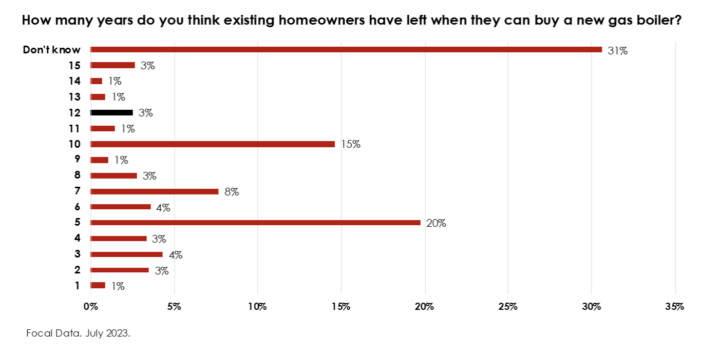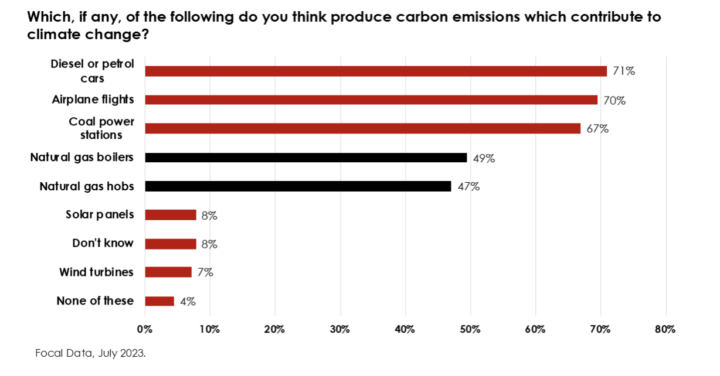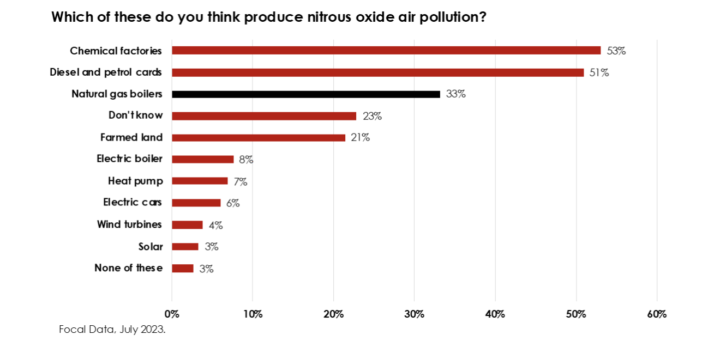Public being confused on gas boiler ban
Unclear messaging means 97% of people do not know when the UK’s target gas boiler phase out will begin, and nearly two-thirds (61%) think it is two or more years sooner than proposed.

By Patricia Curmi
info@eciu.netShare
Last updated:
Unclear messaging, vague policy timelines and a lack of strategic direction mean that the UK public is confused about the UK’s gas boilers phase out, a new poll by Focal Data for the Energy and Climate Intelligence Unit has shown [1].
Only 3% of respondents to the poll got the gas boiler target phase out date of 2035 (12 years’ time) for existing homes correct. Of the other 97% that got the phase out date wrong, or said they didn’t know, around two-thirds (63%) thought it is sooner than it is with the majority (61%) responding that it is two or more years sooner than proposed. Nearly half (43%) thought it was five or more years earlier.

And Jess Ralston, Energy Analyst at the Energy and Climate Intelligence Unit said: “If the gas crisis and soaring gas bills over the last year have taught us anything, it’s that we can’t continue to rely on volatile gas for our home heating. The IMF has said that we’re the worst hit by the gas crisis because we’re so reliant on it and the US and Europe are seeing record sales of alternatives like heat pumps. They have clearly learned a lesson from the last year, but have we?
“The oil and gas industry’s own estimates show that the North Sea is running out, no matter what the Government’s policy on it, so unless we start to reduce our gas demand then we’ll just end up importing more from abroad. Insulating homes and switching to clean heating systems like electric heat pumps means more of our homes can be heated by Great British electricity from our offshore wind farms rather than foreign gas. It’s a no-brainer.”
The poll also found that only half of people know that gas boilers and hobs produce carbon emissions that contribute to climate change (49% and 47% respectively). Heating and cooking currently account for around a fifth of the UK’s carbon emissions [2].

In addition, around two-thirds of respondents (67%) said they did not know that gas boilers produce air pollution. Gas boilers can account for a fifth of nitrous oxides (NOx), a type of air pollution, in some urban areas. NOx has been linked to increases in cardiovascular and respiratory health issues [3]. It has recently been reported that half the nitrogen dioxide in central London comes from gas boilers, a proportion which will likely rise as transport policies like the ULEZ reduce the relative air pollution from vehicles [4].

When the respondents were told that gas boilers produce air pollution, more than half (53%) said it made them more likely to want to switch to a cleaner alternative, with 43% saying it made no difference, and 4% said it made them less likely to want to switch.
The Government currently has a target to phase out gas boilers in existing homes from 2035 [5]. The Boiler Upgrade Scheme currently offers a £5,000 or £6,000 grant for air source or ground source heat pumps respectively. Despite delays to the online portal that allowed installers to progress applications under the Boiler Upgrade Scheme, analysis has shown that the scheme could run out of vouchers if current monthly increases in installation rates continue [6].
The UK committed to phasing out gas boilers in new homes from 2025, as part of the Future Homes Standard, but has yet to confirm whether new homes will be allowed to connect to the gas grid or not despite a consultation being due in ‘Spring’ 2023 [7]. The Government has also not confirmed whether a proposed ban on all fossil fuel boilers in off-gas grid homes will be implemented from 2026 [8].
It has recently been confirmed that the clean heat market mechanism will go ahead. This will require fossil fuel boiler manufacturers to sell a set proportion of heat pumps from 2024, with the proportion rising every year [9]. The market mechanism aims to create a mass market for heat pumps, as it is a nascent industry in the UK today, despite over 20 million being installed across Europe [10].
The Government has committed to making a decision on the role for hydrogen in heating by 2026, although a hydrogen heating trial in Whitby, Elsmere Port has just been cancelled due to resident’s concerns and the other potential location, Redcar, is facing similar challenges [11]. It has recently been reported that one trade body for the heating industry, the Energy and Utilities Alliance, has been extensively campaigning against heat pumps in the UK media [12].
Octopus Energy and British Gas have recently announced that they will reduce the costs of fully installed heat pumps, including the Boiler Upgrade Scheme grant, to as low as £2,500 and £2,999 respectively [13]. British Gas will also offer a money back guarantee. Currently, heat pump manufacturing sites in the UK include those in Cornwall, Derbyshire, Northern Ireland and Scotland [14].
A UK Government study showed that heat pumps are highly efficient, typically 3x more efficient than gas boilers, in the UK even down to -6C [15]. An earlier study also found that “There is no property type or architectural era that is unsuitable for a heat pump”, “from Victorian mid-terraces to pre-WWII semis and a 1960s block of flats”. [16]
Notes to editors:
- Polling conducted by FocalData. Sample size of 2010 adults in Great Britain, between 28th-31st July 2023.
- Energy Live News (2022).
- Kensa manufacture in Cornwall, Vaillant manufacture in Derbyshire, Octopus Energy in Northern Ireland and Mitsubishi Electric in Scotland.